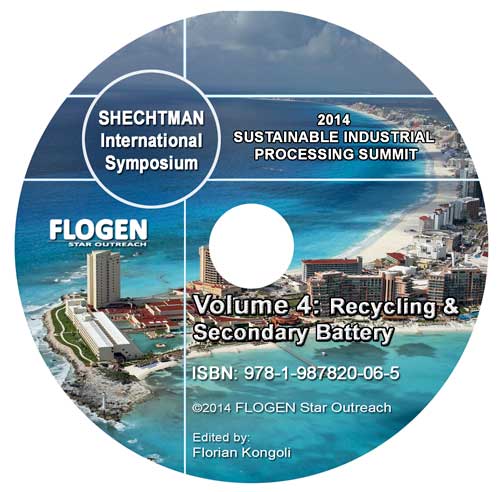2014-Sustainable Industrial Processing Summit
SIPS 2014 Volume 6: Rare Earths & Ionic Liquids
| Editors: | Kongoli F |
| Publisher: | Flogen Star OUTREACH |
| Publication date: | 20 December 2014 |
| Pages: | 432 pages |
| ISBN: | 978-1-987820-08-9 |
| ISSN: | 2291-1227 (Metals and Materials Processing in a Clean Environment Series) |

CD shopping page
Main problems of realization of electrodeposition of refractory and noble metals from low- and medium-temperature melts
Viktor Malyshev1; Dmytro Shakhnin2; Angelina Gab3; Marcelle Gaune-Escard4;1IGIC NASU, Kyiv, Ukraine; 2V.I. VERNADSKY INSTITUTE OF GENERAL AND INORGANIC CHEMISTRY OF THE NATIONAL ACADEMY OF SCIENCES OF UKRAINE, Kyiv, Ukraine; 3NATIONAL TECHNICAL UNIVERSITY OF UKRAINE "KYIV POLYTECHNIC INSTITUTE", Kyiv, Ukraine; 4ECOLE POLYTECHNIQUE, MECANIQUE ENERGETIQUE, CNRS UMR, Marseille, France;
Type of Paper: Regular
Id Paper: 118
Topic: 11
Abstract:
Industrial applications of noble and refractory metals and non-metals and their compounds define further development and improvement of existing technologies and development of new and more effective ones, more effective and ecologically safe. The use of molten ionic electrolytes as reaction medium can solve these problems. To achieve the objectives stated, the following points are necessary:
- electrolyte suitable for this purpose;
- corresponding electrochemical properties of metals and non-metals;
- targeted scientifically substantiated approach to the implementation and control of mechanism and kinetics of electrode processes.
The relevance of the topic is due to its importance for modern melts electrochemistry. From a theoretical point of view, the following issues are of great importance:
1. Mechanism and kinetics of electrode processes of noble and refractory metals and non-metals in low-temperature melts.
2. Study of the melt state after anodic dissolution of metal (ions oxidation state, complexation etc.).
3. Theoretical study of anodic dissolution of metals in multicomponent electrolytes with complexation.
4. Investigation of processes occurring at the interface metal/melt (passivation, adsorption etc.) in steady state and during polarization.
5. Investigation of the mechanism and kinetics of co-deposition of refractory metals with other metals and non-metals in the medium-temperature melts.
From a practical point of view, the following topics are important:
1. Electro-deposition of metals and metal alloys from ionic melts.
2. Possibility to control a form of cathodic deposits (powders, galvanic coatings etc.).
3. Electrochemical synthesis of binary and ternary compounds of refractory metals with non-metals.
4. Possibility of metals separation during processing of their joint raw materials.
5. Electrochemical processing and refractory metals surface polishing.